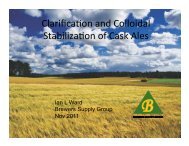Program Book - Master Brewers Association of the Americas
Program Book - Master Brewers Association of the Americas
Program Book - Master Brewers Association of the Americas
Create successful ePaper yourself
Turn your PDF publications into a flip-book with our unique Google optimized e-Paper software.
P-147<br />
An innovative regenerable filtration aid—The future <strong>of</strong><br />
diatomaceous earth-free filtration<br />
UWE SCHNELL (1), Jürg Zuber (2)<br />
(1) BASF Corporation, Florham Park, NJ; (2) FILTROX AG, St.<br />
Gallen, Switzerland<br />
Diatomaceous earth (DE) is a natural filtration aid used during<br />
<strong>the</strong> beer filtration process for decades. The current consumption<br />
<strong>of</strong> DE worldwide by <strong>the</strong> brewing industry is more than 180,000<br />
tons. Disposal costs for used DE are an increasing part <strong>of</strong> total<br />
filtration costs, and so brewers are commonly interested in finding<br />
more economical methods. Crosspure® is a syn<strong>the</strong>tic polymer<br />
for optimal filtration and stabilization in general. It is intended<br />
to use as a regenerable replacement <strong>of</strong> DE which is additionally<br />
capable to removing tannoids, flavanoids and o<strong>the</strong>r haze forming<br />
polyphenols from beer. Just like PVPP, Crosspure® can be<br />
regenerated in a combined regeneration and filtration system—a<br />
closed system comprising a dosing vessel, filter unit and CIP system.<br />
The whole process was developed on a candle filter from FILTROX<br />
AG. The losses arising from continuous dosage and <strong>the</strong> resulting<br />
regeneration process are below 1.0%. In contrast to powder-free<br />
filtration technology, which implicates a fundamental Capex,<br />
Crosspure® can be used in existing, slightly modified DE filter<br />
lines. In general, this new filtration aid has significant benefits in<br />
comparison with existing conventional products, primarily because<br />
it is regenerable, easy to use, synergistically balanced and last but<br />
not least environment friendly.<br />
Uwe Schnell studied at <strong>the</strong> University <strong>of</strong> Applied Sciences<br />
Geisenheim, Germany, majoring in beverage technology and<br />
viniculture. He completed his studies in December 2006 at <strong>the</strong><br />
Rotterdam School <strong>of</strong> Management, Erasmus University, Ne<strong>the</strong>rlands,<br />
with a MBA in strategic management. He worked for eight years<br />
in management and director positions in <strong>the</strong> beverage industry in<br />
Germany, Hungary, and India and had key account responsibilities<br />
for companies such as PepsiCo, Danone, Nestle, Glaxo SmithKline,<br />
and large German customers. His work experience ranges from <strong>the</strong><br />
production process to product development and sales and marketing.<br />
He joined BASF Corporation in April 2007 as manager, new business<br />
development, nutrition ingredients.<br />
138<br />
P-148<br />
Precoat filtration with regenerable filter aid<br />
JUERG ZUBER (1), Helmut Meffert (2)<br />
(1) FILTROX AG, St. Gallen, Switzerland; (2) BASF AG,<br />
Ludwigshafen, Germany<br />
Precoat filtration still is <strong>the</strong> state-<strong>of</strong>-<strong>the</strong>-art filtration technology<br />
for beer, with thousands <strong>of</strong> filter lines in operation around <strong>the</strong><br />
world. Despite discussions about health risks and disposal costs,<br />
DE (diatomaceous earth) is <strong>the</strong> state-<strong>of</strong>-<strong>the</strong>-art filter aid for precoat<br />
filtration. For at least 15 years experts in <strong>the</strong> brewing industry have<br />
been looking for filter aids, which could replace DE, so far without<br />
success. Over <strong>the</strong> last years BASF has developed a new, regenerable<br />
filter aid called Crosspure, which was thoroughly tested on an<br />
industrial scale FILTROX candle filter. For <strong>the</strong> first time <strong>the</strong>re is now<br />
a technically and commercially attractive alternative to DE available,<br />
which can be used to replace DE.<br />
Juerg Zuber completed his studies at <strong>the</strong> Federal Institute <strong>of</strong><br />
Technology (ETH) in Zurich, Switzerland. with a M.S. degree in<br />
process engineering in 1977. He <strong>the</strong>n joined Buhler AG, where he<br />
worked for more than 20 years in a variety <strong>of</strong> R&D and management<br />
positions for <strong>the</strong> food industry. In 2000 he joined FILTROX AG and<br />
is currently CTO and responsible for <strong>the</strong> North American market.



